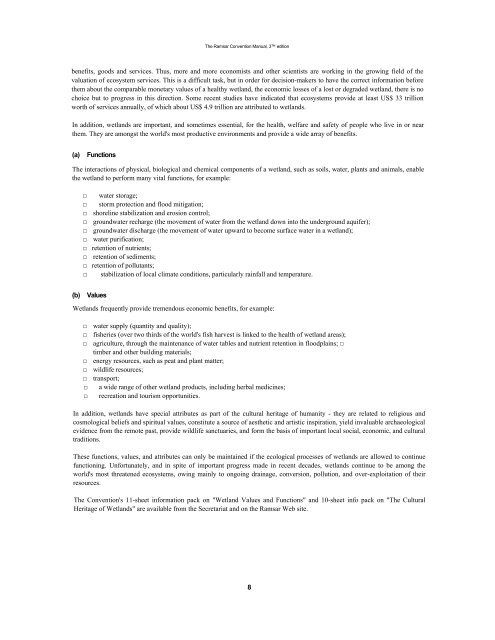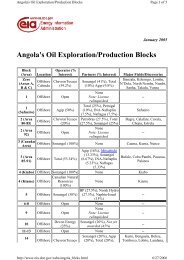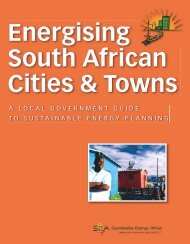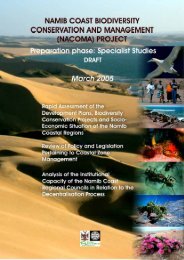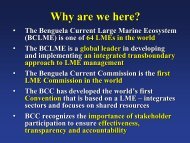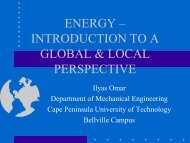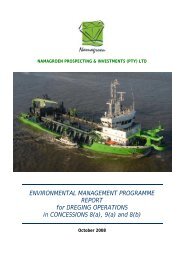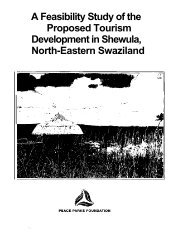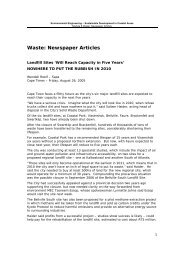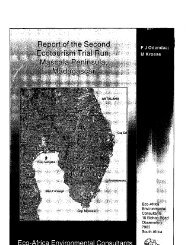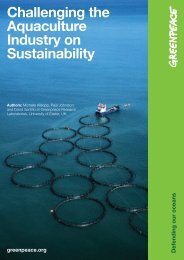The Ramsar Convention Manual.pdf
The Ramsar Convention Manual.pdf
The Ramsar Convention Manual.pdf
Create successful ePaper yourself
Turn your PDF publications into a flip-book with our unique Google optimized e-Paper software.
<strong>The</strong> <strong>Ramsar</strong> <strong>Convention</strong> <strong>Manual</strong>, 3 edition<br />
benefits, goods and services. Thus, more and more economists and other scientists are working in the growing field of the<br />
valuation of ecosystem services. This is a difficult task, but in order for decision-makers to have the correct information before<br />
them about the comparable monetary values of a healthy wetland, the economic losses of a lost or degraded wetland, there is no<br />
choice but to progress in this direction. Some recent studies have indicated that ecosystems provide at least US$ 33 trillion<br />
worth of services annually, of which about US$ 4.9 trillion are attributed to wetlands.<br />
In addition, wetlands are important, and sometimes essential, for the health, welfare and safety of people who live in or near<br />
them. <strong>The</strong>y are amongst the world's most productive environments and provide a wide array of benefits.<br />
(a)<br />
Functions<br />
<strong>The</strong> interactions of physical, biological and chemical components of a wetland, such as soils, water, plants and animals, enable<br />
the wetland to perform many vital functions, for example:<br />
□ water storage;<br />
□ storm protection and flood mitigation;<br />
□ shoreline stabilization and erosion control;<br />
□ groundwater recharge (the movement of water from the wetland down into the underground aquifer);<br />
□ groundwater discharge (the movement of water upward to become surface water in a wetland);<br />
□ water purification;<br />
□ retention of nutrients;<br />
□ retention of sediments;<br />
□ retention of pollutants;<br />
□ stabilization of local climate conditions, particularly rainfall and temperature.<br />
(b)<br />
Values<br />
Wetlands frequently provide tremendous economic benefits, for example:<br />
□ water supply (quantity and quality);<br />
□ fisheries (over two thirds of the world's fish harvest is linked to the health of wetland areas);<br />
□ agriculture, through the maintenance of water tables and nutrient retention in floodplains; □<br />
timber and other building materials;<br />
□ energy resources, such as peat and plant matter;<br />
□ wildlife resources;<br />
□ transport;<br />
□ a wide range of other wetland products, including herbal medicines;<br />
□ recreation and tourism opportunities.<br />
In addition, wetlands have special attributes as part of the cultural heritage of humanity - they are related to religious and<br />
cosmological beliefs and spiritual values, constitute a source of aesthetic and artistic inspiration, yield invaluable archaeological<br />
evidence from the remote past, provide wildlife sanctuaries, and form the basis of important local social, economic, and cultural<br />
traditions.<br />
<strong>The</strong>se functions, values, and attributes can only be maintained if the ecological processes of wetlands are allowed to continue<br />
functioning. Unfortunately, and in spite of important progress made in recent decades, wetlands continue to be among the<br />
world's most threatened ecosystems, owing mainly to ongoing drainage, conversion, pollution, and over-exploitation of their<br />
resources.<br />
<strong>The</strong> <strong>Convention</strong>'s 11-sheet information pack on "Wetland Values and Functions" and 10-sheet info pack on "<strong>The</strong> Cultural<br />
Heritage of Wetlands" are available from the Secretariat and on the <strong>Ramsar</strong> Web site.<br />
8


